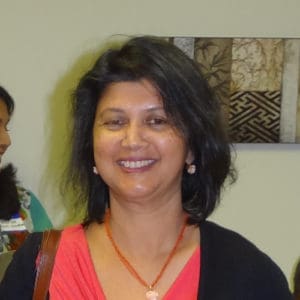Mediation’s Ability to Break Borders. Member Spotlight: Preeti Asthana
Preeti Asthana, originally from India, is a trained and certified mediator now living in Toronto, Canada. Currently, she is a self-employed information and referral coordinator, providing clients with information on issues relating to divorce, child protection, and mediation services.
Preeti received her schooling in India, obtaining her Master’s in Sociology from the University of Hyderabad. With her degree, she began her professional career in social work, as a project coordinator of the Childline program, a 24-hour helpline for child distress. Following a career of social work, she became a program manager of projects funded by the agency on issues such as education and empowerment of women. She was responsible for evaluating and assessing how the projects progressed and how much funding they needed to continue. Through her social work, Preeti explains that she had already begun using mediation skills that she would later learn as she became an accredited mediator.
“Mediation just sort of fell in my lap”

After moving to Canada, Preeti’s career took a different course. After looking for positions in social work, she finally entered a career in mediation since she could not move around much with her child. “Mediation just sort of fell in my lap”, she admits, “I started pursuing it as my second career, alongside social work”. With her background in community engagement, she began mediating community and family mediation at Peel Family Mediation Services. Here, Preeti also increased awareness of family mediation and education programs targeted at the South Asian community. As mediation has not fully developed in India, Preeti says, “I would love to go back to India and provide training in mediation (train the trainers), because this concept is not common there”. In the South Asian country, lawyers conduct mediation, but this is “very different to what the concept of mediation actually represents”, Preeti explains.
Preeti explains that mediation is always preferable to litigation, “you come together and discuss, and you see it from the viewpoint of the other person. It becomes more comprehensive, and you begin to understand the nuances around it”. While litigation is a win-lose situation, mediation allows both parties to work together and find a solution. Preeti distinguishes that family mediation is quite emotional and “is limited to the parents and the couple”, whereas “community mediation gives you a bit of a wider perspective, things can be settled more through conflict resolution”. Although a successful mediator, Preeti acknowledges that it can be difficult for mediators to detach themselves from the case. “You see things happening, but it’s not your place to tell them”, she says, “this is self-determination, letting the parties arrive at their own conclusions”.
Unpredictability of Mediation
Mediation cases can go one way and “in one snap, go the other direction”. Preeti recalls a community mediation case she was responsible for settling. The parties were so opposed that they did not want to meet to discuss. They told Preeti that they will not agree on things and it was a waste of time. Preeti persisted that there were benefits to mediation and formalizing an agreement. “We started to discuss”, she recalls, “and it reached the point where they exchanged apologies and suddenly, you saw a middle ground form and the parties joined together”. It was very satisfying to see the hard work paid off when the parties did finally decide to come together, but rejoiced this moment as mediation has the ability to facilitate productive discussion.
MBBI Breaking Borders
Preeti found MBBI through a colleague of hers. She became a part of the UN Multilateral Working Group and through this, attended a 2-week conference on the UN Commission on the Status of Women in New York. The conference aimed at understanding how mediation currently affects women and how women can contribute to peacebuilding and mediation. “It was great because we got to meet people from all over the world”, Preeti says. Preeti believes that MBBI can go a long way, “the title itself says mediators beyond borders, it implies the international component with no boundaries to make it restrictive, not confined to the national sphere.”
Mediation is a powerful tool today. It may have been important before, but the problem lies in that people must be open to coming to the table to settle. The important thing, Preeti says, “is that we understand if we put mediation out there, it will open doors to people to say, ‘this is one option, let’s try it.’ “I love the concept of peacebuilding, there’s conflict everywhere and we can help a lot and get things started, if not complete it. We can put the word out there and see how we can get involved”.
Article by Emily Shultis, MBBI Writer
